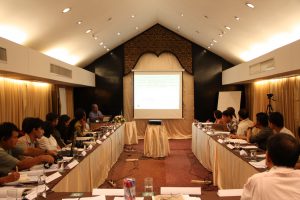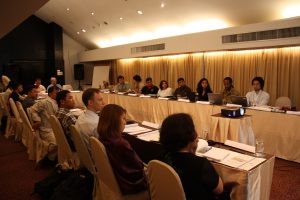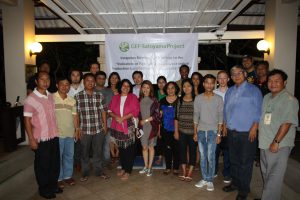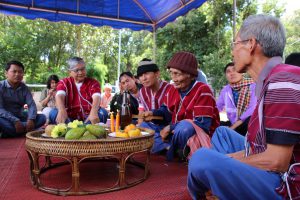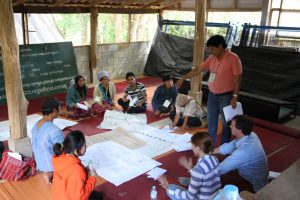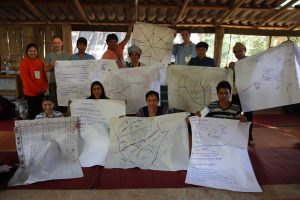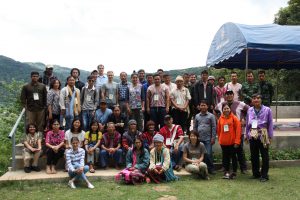Workshops and Training Opportunities
Report – Inception Meeting and Indicators of Resilience Training in Indo-Burma Biodiversity Hotspot[Chiang Mai, Thailand]
2016.07.25
INCEPTION MEETING
The inception meeting was held on July 25, 2016 at the Eurasia Chiang Mai Hotel with the following objectives:
• To ensure all subgrant project proponents to have the common understanding about the GEF-Satoyama Project and its requirements
• To take the first step in mainstreaming the SEPLS in development policy and plan (introduction to government representatives)
• To be familiar with other subgrant projects
Highlights
1. Welcoming remarks and an overview of the GEF-Satoyama Project were given by Dr. Yoji Natori, Manager of the GEF-Satoyama Project.
2. The highest ranking government official in attendance, Mr. Panger of the Government of Nagaland in his address highlighted the importance of the Indo-Burma Biodiversity Hotspot, the value of cross border considerations, uniqueness of the various indigenous groups and the value of their culture and traditions. He expressed the hope that the engagement in the training will see a cohesive approach to the issues facing the hotspot and how to resolve and/or mitigate them. He gave the example of the Amur Falcon case where they were hunted but within a year they stopped and the area is now a haven for them with an increased potential for tourism.
3. Presentations were made by representatives of the subgrantees of the hotspot about their respective projects. Ms Gurveena Ghataure represented FFI, Dr. Prasert Trakansuphakon represented IMPECT while Dr. Pia Sethi represented TERI.
4. GEF-Safeguards and technical reports were made by Dr. Devon Dublin, Project Coordinator, GEF-Satoyama Project.
5. Financial aspects were given presented by Mr. Takamasa Ogasawara, responsable for Operations/Financial matters for the GEF-Satoyama Project.
6. The GEF-Satoyama Project’s website was explained by Ms. Asako Isobe, responsible for communications matters of the GEF-Satoyama Project.
Photos
INDICATORS OF RESILIENCE IN SOCIO-ECOLOGICAL PRODUCTION LANDSCAPES AND SEASCAPES
A training on the Indicators of Resilience in Socio-ecological Production Landscapes and Seascapes was held in Chiang Mai, Thailand, during July 25 – 27, 2016. Through a classroom training and field practical training, the training aimed to build capacity of GEF-Satoyama Project subgrantees and others on using the “Resilience Indicators in Socio-ecological Production Landscapes and Seascapes (SEPLS)” during the project management cycle. This was first of the three regional trainings, which will be followed by ones in Madagascar and Ecuador.
Objectives:
● Develop strong knowledge about the “Indicators of Resilience in Socio-ecological Production Landscapes and Seascapes (SEPLS)”
● Enable to organize the resilience assessment and develop resilience strengthening strategies at the landscape/seascape level by communities
● Understand ways to enhance communication among stakeholders and empower communities in decision-making process and adaptive management for the conservation and sustainable use of biodiversity at landscape/seascape level
Language:
English and local language of communities (Thai and Karen)
Participants
The training attracted a total of 60 persons with international participants from Cambodia, India, Myanmar, Philippines, Thailand and Vietnam. Japan based trainers from the Institute for Global Environmental Strategies (IGES) and United Nations University Institute for the Advanced Study of Sustainability (UNU-IAS) conducted the training. These participants were representatives of the subgrantees in Indo-Burma, namely, Fauna and Flora International, Inter Mountain Peoples’ Education and Culture in Thailand Association (IMPECT) and The Energy and Resources Institute; as well as government representatives from the Ministry of Natural Resources and Environmental Conservation of Myanmar, Ministry of Agriculture and Irrigation of Myanmar and the Government of Nagaland of India. Participants were also fielded from the International Center for Tropical Agriculture (CIAT) in Vietnam, Conservation International Cambodia, Highland Research and Development Institute (HRDI) in Thailand, Indigenous Knowledge and Peoples Foundation (IKAP) in Thailand, Pgaz K’ Nyau Association for Sustainable Development (PASD) in Thailand, the University of Philippines Los Banos, the Village Support Group (VSG) of Cambodia and the Center for Water Resources Conservation and Development (WARECOD) in Vietnam. Members from the local communities of Mae Tae Khee, Mae Umpai and Mae Yod participated in the practical sessions of the training.
Feedback
● On the general conduct of the training and the organization of the training, 93.75% participants rated it highly.
● All participants felt that the training achieved its objectives and 87.5% of them expressed that their expectations were met.
● Participants found a wide cross section of the training material to be useful with 50% of them expressing that the training will be mostly useful for their job.
Photos

